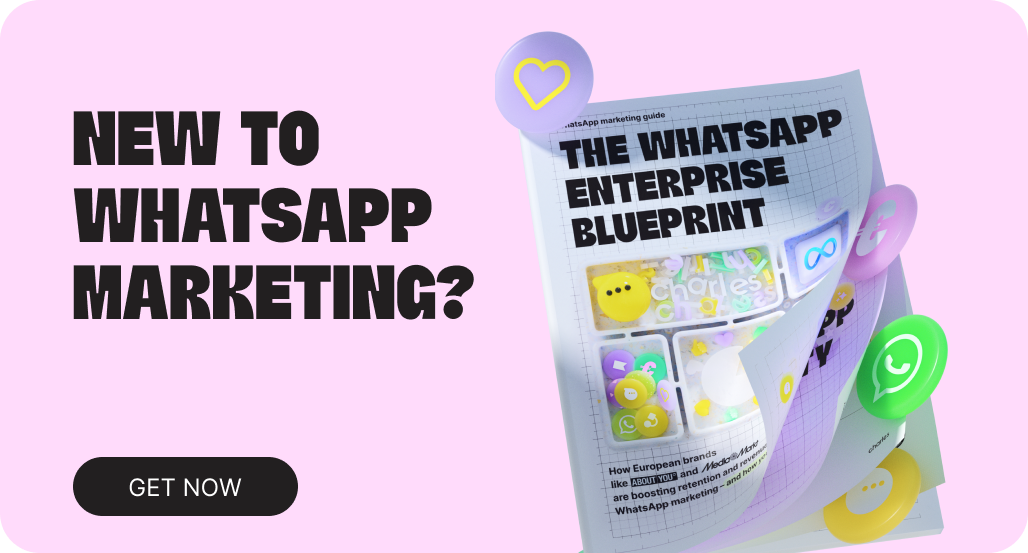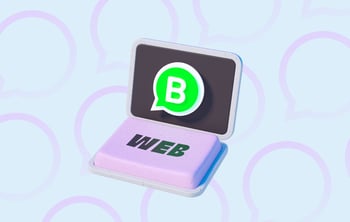Table of Contents
Service conversations will be free for businesses and fees will be charged per template message sent out. Find out more about the new WhatsApp Business pricing.
Meta has announced pricing changes for businesses using its WhatsApp Business Platform (API). We give you an overview of the changes and what they mean for you as a business and/or charles customer.
Contents
New WhatsApp Business API pricing
Why Meta is changing pricing
Dates to remember and who is affected
How WhatsApp's new pricing will impact businesses
7 actions for businesses to take
Key takeaways
New WhatsApp business API pricing
Meta is moving from conversation-based to template message-based pricing, and from messages sent to messages delivered:
- Costs will now be charged per message for template messages delivered rather than per conversation
- Each template message delivered will cost the same as a conversation currently costs in most cases
In addition:
- Service conversations (user-initiated) will be free from November 1, 2024
- Utility template messages delivered inside of a 24-hour customer service window will be free starting April 1, 2025
WhatsApp pricing terminology explained
Template
Templates are used in template messages to open marketing, utility, and authentication conversations with customers. Unlike free-form messages, template messages are the only type of message that can be sent to customers who have yet to message you, or who have not sent you a message in the last 24 hours.
Templates must be approved before they can be sent in template messages.
Conversation
Conversations are 24-hour message threads between you and your customers [until the new changes come into affect]. They are opened and charged when messages you send to customers are delivered.
[Note: the term conversation will no longer be used with regard to WhatsApp API pricing when the changes come into effect]
Conversation categories
Conversations, now being phased out, are categorized with one of the following categories:
-
Marketing – Enables you to achieve a wide range of goals, from generating awareness to driving sales and retargeting customers. Examples include new product, service, or feature announcements, targeted promotions/offers, and cart abandonment reminders.
-
Utility – Enables you to follow-up on user actions or requests. Examples include opt-in confirmation, order/delivery management (e.g., delivery update); account updates or alerts (for example., payment reminder); or feedback surveys.
-
Authentication – Enables you authenticate users with one-time passcodes, potentially at multiple steps in the login process (e.g., account verification, account recovery, integrity challenges).
-
Service – Enables you to resolve customer inquiries. Initiated by customers.
Customer service window
Whenever a WhatsApp user messages you, a 24-hour timer called a customer service window starts (or refreshes if one has already been started).
With the exception of template messages, you can only send a message to a WhatsApp user when a customer service window is open between you and that user (i.e. the timer has not expired).
Unlike other message types, template messages can be sent to a user at any time, as long as the user has opted-in to receiving messages from you.
New pricing categories
| Old conversation categories | New categories | Pricing |
| Marketing | Marketing template | All marketing template messages delivered incur a fee |
| Utility | Utility template |
|
| Authentication | Authentication template | Authentication rates are charged depending on the country |
| Service | N/a – turns into a non-template message |
Free when replying to incoming customer service messages – businesses can message their customers for free using free-form messages within the 24-hour customer service window
|
For Meta fees, see the current rates and updated rates
Dates to remember
- 1 November, 2024: Service conversations (user-initiated) become free
- 1 April, 2025: Utility templates delivered within the 24-hour customer service window become free
- 1 July, 2025: New per message pricing comes into effect
These updates reflect an industry-wide shift and are designed to ensure high quality marketing experiences, while rewarding businesses for providing helpful support to customers through WhatsApp. The majority of customers can expect overall stability in total costs, as long as they adapt their usage to the new structure.
By finetuning their usage, businesses can continue to benefit from WhatsApp’s high-value communication channel without disruption.
Who's affected by the new pricing?
All businesses using the WhatsApp Business Platform (API) – whether through a Solution Partner like charles, a Tech Provider, a Tech Partner or those managing a WhatsApp platform themselves.
Why Meta is changing pricing
On Meta's official pricing update page, they say:
"We are updating pricing on the WhatsApp Business Platform to be simpler and more consistent with industry practices, encourage higher-quality messaging experiences for people, and better align with value delivered for people and businesses."
charles CEO and Founder, Andreas Tussing, says:
"Meta tells us they want to be more comparable across marketing channels, as others usually charge per message, not a time window.
"They have also told us they only want to charge for those messages that add value to the business, while ensuring quality remains high and there is no spam on the platform.
"This is in line with a general shift in SaaS industry pricing as we have seen with companies like Salesforce, that with their AI agents are moving to more value/outcome-based pricing rather than charging for seats or access to software.
"Service conversations are being rewarded particularly because WhatsApp is a great channel for businesses to be more helpful towards their customers and deliver desirable customer experiences. And so, Meta is incentivizing businesses to provide more of this service aspect to their customers."
See Andreas's pricing announcement on LinkedIn
How the new WhatsApp pricing will impact businesses
These changes are designed to streamline the pricing structure and associate cost towards messaging aimed at creating revenue or actions that drive revenue – rather than charging businesses for customer experience essentials.
Since prices of marketing or utility templates remain stable in most regions, businesses should experience overall stability in total costs, as long as they adapt their usage to the new structure.
As service conversations and utility template messages delivered inside of a 24-hour customer service window will be will be free, you’ll have new opportunities to add customer service communication to the use of marketing templates, for a more holistic, end-to-end customer experience – and without seeing unnecessary cost increases.
The key to maximizing the benefits is adapting to the new template-based structure, and we’ll be with our clients every step of the way to ensure their WhatsApp strategies remain cost effective and impactful.
Our approach will consist of measures that optimize client setups to reduce costs, as well as measure to unlock new opportunities. Each marketing message should be relevant for the user and focused on driving business performance.
Actions businesses can take
We see these changes as an opportunity for brands to refine their WhatsApp strategy to be more in line with building end-to-end customer journeys that are both optimized for customer experience as well as for cost efficiency.
The first step to maximizing the benefits is a review of your existing setup, i.e., the WhatsApp touchpoints along the customer journey and how to adapt these in the best way possible to this new template-based structure.
Our recommendations to ensure your WhatsApp strategy remains cost effective and impactful are:
1. Optimize your current setup to maintain cost efficiency
- Streamline use of templates: We’ll help you simplify your automations (flows) by reducing the use of multiple marketing templates in a single flow, focusing on combining them with service messages where possible.
- Eliminate unnecessary extra notifications: For future campaigns, we suggest to identify and remove additional “pre-notifications” and “reminders” that would now carry extra costs but might not provide sufficient additional value.
- Refine user-initiated flows: We’ll adjust welcome and other user-initiated flows to reduce or replace marketing templates, overall simplifying your messaging while maintaining impact.
2. Unlock new opportunities for greater value
- Promote more user-initiated conversations: These will soon be free as long as marketing templates aren’t used, allowing you to encourage user engagement without extra costs.
- Build out service experiences: We encourage businesses to be available for their customers on WhatsApp and respond to any customer message at no charge using free-form messages within the 24-hour customer service window.
- Leverage consultative selling: Engage customers in product recommendation or consultative conversations, enhancing their experience while minimizing cost. One great example is our customer Dermalogica that have been using WhatsApp successfully to offer customers 1:1 consultations with their skincare experts, broadening accessibility of their expertise and gaining some happy customers.
3. Revisit attribution metrics: focus on revenue per recipient (RPR)
With the phase-out of the concept of revenue per conversation (RPC) – a charles' KPI which was focused on tracking the revenue from WhatsApp and specific to the channel and cost structure, we recommend looking now at revenue per recipient (RPR) as a more accurate measure of success. (More on WhatsApp KPIs here.)
A benefit is that RPR aligns better with other marketing channels. Now, brands can track how much revenue each customer interaction (message or recipient) is generating, offering a clearer comparison with email, SMS and other paid messaging solutions.
Key takeaways
Meta’s pricing update is a natural evolution of the WhatsApp platform. The goal of the pricing change as we understand it is to be simpler and more consistent with industry practices, encourage higher-quality messaging experiences for people, and better align with value delivered for people and businesses. With the right adjustments, your costs can remain stable while unlocking new opportunities for growth.
With a careful approach, total costs shouldn't increase for businesses. And with the removal of fees for service conversations, brands have an opportunity to engage customers and make sales (using automation where possible) during service conversations.
We’re here to help you make the most of these changes and ensure that WhatsApp remains a key driver of your success.
To speak to our sales team, contact us here.
If you are a charles customer, please talk to your Success Manager or our Support Team via our platform. We'll help review your setup and make sure you’re ready for these changes.








